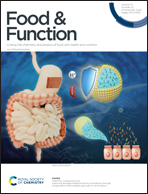Jerusalem artichoke inulin supplementation ameliorates hepatic lipid metabolism in type 2 diabetes mellitus mice by modulating the gut microbiota and fecal metabolome†
Abstract
The main focus of this study was on the protection mechanism of Jerusalem artichoke inulin (DI) against type 2 diabetes mellitus (T2DM) associated with abnormal hepatic lipid metabolism and gut microbiota dysfunction in high-fat diet and streptozotocin-induced diabetic mice. It was determined that the consumption of DI significantly improved the biochemical parameters and physiological indices linked to T2DM, including the reduction in blood glucose, HbA1c, triglyceride, total cholesterol, and low-density lipoprotein cholesterol levels as well as the contents of serum pro-inflammatory cytokines. Supplementation with DI also ameliorated abnormal hepatic lipid metabolism by altering the expression of genes involved in the production and breakdown of lipids and cholesterol. Microbiological analysis showed that DI supplementation resulted in an enrichment of Prevotellaceae UCG-001, Parasutterella, Prevotellaceae UCG-003, and Dubosiella. Metabolomics revealed 89 differential metabolites closely related to DI intervention, and showed that DI supplementation regulated amino acid metabolism (e.g., indole), lipid metabolism (e.g., phosphocholine), cofactor and vitamin metabolism (e.g., cholecalciferol), nucleotide metabolism (e.g., thymine) and the digestive system (e.g., 7-ketolithocholic acid). Overall, Jerusalem artichoke inulin has a remarkable capacity to ameliorate abnormal hepatic lipid metabolism and gut microbiota dysfunction linked to T2DM.

- This article is part of the themed collection: Food & Function HOT Articles 2022


 Please wait while we load your content...
Please wait while we load your content...